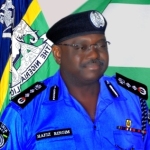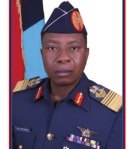Blog Archives
Coastal Security: IGP Ringim commissions 6 patrol boats for police in Lagos State
On 7 June, the Inspector-General of Police (IGP), Mr Hafiz Ringim, handed over six new patrol boats to the Marine Department of the Lagos State Police Command, to strengthen security in the coastal areas of the state.
Speaking at the commissioning ceremony held at the Marine Police Headquarters in Ikoyi, Lagos, Mr Ringim said the provision of the boats was in recognition of the special security challenges facing Lagos as the nation’s largest commercial centre.
The police chief said that following his tour of Nigerian National Petroleum Corporation (NNPC) facilities and tank farms in January, it became imperative to add six additional back-up boats for effective patrol of the facilities. He said there was a critical need to secure federal and private property in the state, citing in particular the NNPC facilities along the coast line at Atlas Cove, Ibafon, Badagry, Epe, Apapa, Ijora Coal, Marina and even some nautical miles offshore.
He said: “With the inauguration of these gunboats, I expect that the police in Lagos will be able to provide adequate security for all Federal Government installations and vital public and private assets along the riverside areas.”
The Lagos State Governor, Babatunde Fashola, who was at the occasion, praised the IGP for meeting the demand of the Lagos Police Command for more gunboats. Reiterating his own administration’s commiment to fighting crime in the state, he said: “Crime has no place in our society, so we will invest very deeply and extensively in crime prevention, to boost the capacity of security personnel”. He further disclosed that the Lagos State Security Trust Fund (LSSTF) was also planning to purchase additional gunboats for police in the state.
The Commissioner of Police in Lagos State, Mr Yakubu Alkali, pledged that the marine police will serve Lagosians better, particularly the residents of Ikoyi, VictoriaIsland and Lekki Peninsula.
No more Army, Police clashes, says Chief of Defence Staff Petinrin
On 3 June, the Chief of Defence Staff, Air Chief Marshal Oluseyi Petinrin, declared that clashes between soldiers and personnel of other security agencies, especially the Police, will no longer occur in the country.
Petinrin, who was in Lagos for activities winding up the 55th anniversary of the Nigerian Navy, told newsmen that a joint investigation by the Army and Police was already underway to establish the truth of the 24 May incident in Badagry, Lagos State, where some police officers were murdered, allegedly by soldiers.
The Chief of Defence Staff, who graced the occasion with other service chiefs, including the Chief of Army Staff, Lt Gen. Azubuike Ihejirika, Chief of Naval Staff, Vice Admiral Ola Sa’ad Ibrahim, and Chief of Air Staff, Air Marshal Mohammed Dikko Umar, said the Badagry incident was unfortunate.
He added: “I can assure you that these clashes will not happen again…You can see that the Inspector-General of Police and the Chief of Army Staff have sat down together to look into the matter. No one knew what actually happened. Investigations are on. The investigation that is being conducted now is being done by a joint team of police and army personnel”.
The Chief of Army Staff, Lt Gen Ihejirika, also pledged to ensure better co-operation between his soldiers and the personnel of other agencies, in order to prevent any further clashes in future.
Badagry killings: NGO coalition tasks President and Police to punish culprits, honour victims
On 31 May, a coalition of three reputable non-governmental organisations (NGOs) urged President Goodluck Jonathan to set up a judicial commission of inquiry into the recent killing of some police officers in Badagry, Lagos State, by suspected soldiers.
The coalition, comprising CLEEN Foundation, Network for Police Reform in Nigeria (NOPRIN) and Community Life Project, said this was necessary in order to fish out the killers and bring them to justice, and also to discourage impunity and atrocities committed by soldiers and other personnel of armed services in the country.
Speaking with reporters in Lagos on behalf of the coalition, Executive Director, CLEEN Foundation, Mr Innocent Chukwuma, said the groups were demanding an inquiry “rather than the current espirit de corps panel established by the Chief of Army Staff and the Inspector General of Police, which may end up sweeping the matter under the carpet”.
Chukwuma said the groups were also demanding that the murdered policemen be given a national burial, which should be attended by President Jonathan. He said: “This is to make the point that it is not only the death of fellow politicians that he cares about, but that the lives of ordinary Nigerians, including the men and women in police uniform, matter”.
The coalition also asked that the families of the slain policemen be adequately compensated for the loss of their breadwinners and the pillars of their homes.
It added that: “The Nigeria Police should also establish a memorial hall within the Force headquarters in honor of the officers who died in the line of duty, which should be named the ‘Badagry Three Hall’. The Force should also consider setting aside a day or week every year to organise activities in memory of fallen policemen”.
The background to the coalition’s demands is the incident in Badagry on 24 May, in which the Divisional Police Officer (DPO) of Badagry Police Division, CSP Samuel Salisu in the company of the Divisional Crime Officer (DCO), DSP Samson Okedusi and the Operations Officer, ASP Afolabi Taofeek, on a peace mission to 242 Recce Military Cantonment at Ibereko Badagry, were reportedly ambushed and killed by unidentified soldiers. In response to the incident, the Chief of Army Staff and the Inspector General of Police jointly constituted a committee to investigate the killings.
[See the Press Statement titled: BRING THE SOLDIERS TO JUSTICE! also on this website].
BRING THE SOLDIERS TO JUSTICE: Press Statement by CLEEN Foundation on the Gruesome Murder of Three Police Officers by Soldiers in Badagry on 24 May 2011
Position and Demand
The CLEEN Foundation’s position and demand on the recent gruesome killing of three senior police officers by soldiers in Badagry are that:
The new government of President Jonathan should fish out the perpetrators and bring them to justice through a judicial inquiry rather than the current espirit de corps panel established by the Chief of Army Staff and the Inspector General of Police, which may end up sweeping the matter under the carpet.
The officers should be given a national burial, which should be attended by no less a person than President Jonathan himself, to make the point that it is not only the death of fellow politicians that he cares about and that the life of ordinary Nigerians including the men and women in police uniform matters.
The families of the deceased should be adequately compensated for the loss of their dear ones, breadwinners and pillars of their homes. The compensation package should include money, national awards, health insurance coverage and scholarships to their children.
The Nigeria Police Force should also establish a memorial hall within the force headquarters in honor of officers who die in the line of duty, which should be named after the ‘Badagry Three’. The force should also consider setting aside a day or week every year to organize activities in memory of their fallen ones.
Background
In the morning hours of Tuesday, May 24, 2011, the Divisional Police Officer (DPO) of Badagry Police Division, CSP Samuel Salisu in the company of the Divisional Crime Officer (DCO), DSP Samson Okedusi and the Operation Officer, ASP Afolabi Taofeeq, reportedly went to see the commanding officer of 242 Recce Military Cantonment, located at Ibereko, a suburb of Badagry in Lagos State, on a peace mission. The visit was prompted by a conflict between soldiers from the cantonment and police officers in Badagry, following an incident the previous day in which policemen at a checkpoint in Badagry allegedly killed a solider following a scuffle. The conflict had degenerated to a level where soldiers were hunting down policemen for attack to avenge the death of their colleague, hence the visit by the DPO and his team to find a solution to the matter. A journey they never returned from!
On their way to Ibereko military barrack, they were reportedly ambushed by a gang of soldiers and thus ensued the most gruesome killing of police officers in Nigeria in recent times. The DPO and DCO were said to have been shot several times and hacked to death with machetes by soldiers who stripped and dumped them on the roadside. The Operations Officer escaped to the bush with gunshot wounds and died a few days later in a hospital.
This incident was reported to have taken place in the morning hours on the fateful day and the corpses of the DPO and DCO were left on the road till about midnight according to police sources!
Context
This is not the first time soldiers in Nigeria would be indulging in self-help and imposing community punishment on the police and members of the public whenever their colleagues were allegedly killed:
On April 20, 2011, Abdullahi Garuba, a Police Corporal with Force No 244238 serving in MOPOL 2, Lagos had an argument with 2 privates of the Nigeria Army – Simon Lucky (09NA/52/0732) and Oladepo Temitope. The argument led to a brawl and the 2 privates beat up the Police Officer, stabbed him severally and left him half dead. He was rushed to a hospital and later died. Both soldiers are yet to be prosecuted and the matter was hushed between the leadership of the police and the military.
In 2010 in Ilesha, Osun State, a soldier was found dead in a gutter apparently following a drinking spree. The reaction of his colleagues when he was discovered was to embark on a house-by-house harassment and brutality of people residing in the area. Some were allegedly killed.
On October 4, 2005, in Ojuelegba, Lagos, soldiers killed five policemen and burnt Area C Police Command headquarters along with about 60 vehicles parked in the premises. The soldiers also set free 34 criminal suspects who were in the custody of the police.
Concerns of CLEEN Foundation
What makes this latest incident very painful to us in CLEEN Foundation is that Badagry Police Station, led by late DPO Salisu, was among the three police stations in Nigeria that won the 2010 Altus Police Station Award for exemplary services to their communities. It was perhaps because of the exemplary leadership qualities of the DPO that he and the two other officers are dead today. If he had sat back in his office and allowed the conflict between his men and soldiers to rage, they may not have died.
We are therefore worried that if nothing is urgently done to bring the perpetrators of this latest heinous incident to book and adequately compensate the families left behind among other demands we made above, the government would be reinforcing and encouraging impunity, which has permeated and pervaded atrocities armed services in Nigeria.
Innocent Chukwuma
Executive Director, CLEEN Foundation
31 May 2011
Army and Police in bloody fight, 8 reported killed, in Badagry, Lagos State
On 24 May, soldiers from the 242 Recce Battalion, Iberepo, near Badagry in Lagos State, attacked and killed several policemen, in apparent reprisal against the killing of a soldier by a policeman, the previous night.
The trouble between the two parties started around 8.30pm on the night of Monday 23 May, but there are at least two versions of the incident that sparked it.
According to one account, a soldier dressed in mufti and who was escorting a vehicle loaded with goods from the Nigeria\Benin Republic border, was accosted by a police officer attached to the Lagos State Police Rapid Response Squad (RRS), who demanded to search the vehicle. The soldier had challenged the policeman and threatened to disarm him if he did not allow the vehicle free passage. Provoked by that challenge, the policeman shot the soldier at close range, killing him instantly.
The second account, by someone who claimed to have witnessed the encounter, said the soldier, a staff sergeant who was on his motorcycle, was flagged down by the policemen at a check-point. Despite showing his identification card, the police personnel were still not satisfied about his identity and an argument ensued. As the soldier made to ride off, a policeman shot him from behind. The account said the soldier managed to phone his colleagues on anti-robbery patrol who rushed to rescue him, but only found him dead.
The sources said that four of the policemen at the check-point were promptly arrested by police authorities. Seeking to avert a crisis, the Divisional Police Officer (DPO), Mr Saliu Samuel; the head of the State Security Service (SSS) in the area; and the Commanding Officer of the 242 Battalion, Ibereko, promptly met to calm the rising tensions.
In spite of those good efforts, some soldiers set out early the next morning, attacking any policeman in sight, and in defiance of a No-violence order given to them by the commander of the barracks, Colonel Nabasa. Some of them stormed the branch of Oceanic Bank in the town and attacked the policemen guarding it, and even some bank customers. From there, they blocked roads and searched vehicles to fish out any policemen on board.
The sources further said that on learning of the attacks, the DPO suggested to his DCO that they should meet with the commander of the Army Barracks to sue for peace. Somewhere on that mission, some soldiers opened fire and shot the two officers, and another policeman, dead. Town residents say the bodies of the three slain police officers were left at the kerb at Aradagun bus stop on the Lagos-Badagry expressway. The DPO’s orderly and driver were critically wounded, but they made it to a hospital.
Two police patrol vehicles belonging to the Police Rapid Response Squad (RRS) were subsequently set ablaze, while their occupants were chased and shot dead. Up till late in the day, sources said soldiers were still on rampage, searching for policemen to attack. Some members of the Police Mobile Unit were also said to be threatening a full-scale war with the soldiers.
In Abuja, the federal capital, some reports said the Police Force headquarters had directed the commanders of all anti-riot (MOPOL) units to maintain the peace while the authorities meet to iron out the problem. The reports said the Inspector General of Police (IGP), Alhaji Rafiz Ringim, had met with the Chief of Army Staff, to call his men to order.
In a press release signed by the Force Public Relations Officer (FPRO), Deputy Commissioner of Police (DCP) Olusola Amore, the IGP enjoined officers and men on both sides to exercise restraint and stop the attacks. He also ordered a high-powered investigation into the incident.
In Lagos, the State Police spokesman, Mr Samuel Jinadu, told newsmen there was no cause for alarm as the situation had been brought under control. The Public Relations Officer of the Lagos-based 81 Division of the Nigerian Army, Lieutenant Colonel Kayode Ogunsanya, also said the situation had been brought under control, stressing the incident would be thoroughly investigated.
There had been several clashes between members of the various security agencies in the middle years of the last decade. In one notable incident on 4 October 2005, policemen and soldiers clashed at the Ojuelegba area of Lagos State, leaving five policemen dead, the Police Area Command headquarters razed, 60 vehicles including 20 police jeeps set ablaze and 34 ‘awaiting trial’ detainees freed from the police cells.
However, such incidents had not occurred in recent years, partly because successive helmsmen of the key agencies had been laying greater emphasis on inter-agency coordination and cooperation.
Drug law agency destroys N9 billion worth of illicit drugs in Lagos
On 8 May, the National Drug Law Enforcement Agency (NDLEA) reported that on 6 May, it destroyed 7,970.8kg of drugs at its Ibereko Area Command Office in Badagry, Lagos State. A statement by NDLEA spokesman, Mr. Mitchel Ofoyeju, put the value of the destroyed drugs at 9.2bn naira (about 61.3 million USD).
Speaking at the destruction event, the NDLEA chairman, Mallam Ahmadu Giade, said most of the drugs were destined for America and Europe, but were seized in Lagos. He said that this was the third drug destruction event since the beginning of 2011.
Noting that drugs “aggravate crime and distort the economy through money laundering with adverse social consequences,” the NDLEA helmsman advocated stiffer penalties for drug traffickers. He said the “minimum sentence in terms of punishment for the offenders should be 15 years”. But he also added that if the law could be amended to make the penalty a life sentence, “maybe they (the traffickers) will desist from doing the business”.
Border communities are aiding smugglers, says Nigeria Customs Service
On 10 February, the Nigeria Customs Service (NCS) disclosed that its anti-smuggling efforts were being undermined by the unpatriotic residents of some border communities who actively aid smugglers.
Speaking at a two-day seminar on Challenges of Border Control organised by the Maritime Reporters Association of Nigeria (MARAN), held in Topo, Badagry in Lagos State, the Acting Comptroller, Federal Operations Unit in Zone A, Mr Victor Dimka, said such border community residents were not only shielding smugglers from arrest, but were in fact joining them to attack officers and men of the Service.
He said some of the attacks had been deadly, as the border villagers and smugglers sometimes use firearms that are more sophisticated than those used by the Customs men. He however disclosed that the NCS will soon take delivery of new weapons that will be used to counter such attacks very effectively. He expressed optimism that “With the current management of Customs, some of the challenges (being encountered) in border patrol will soon become history”.






